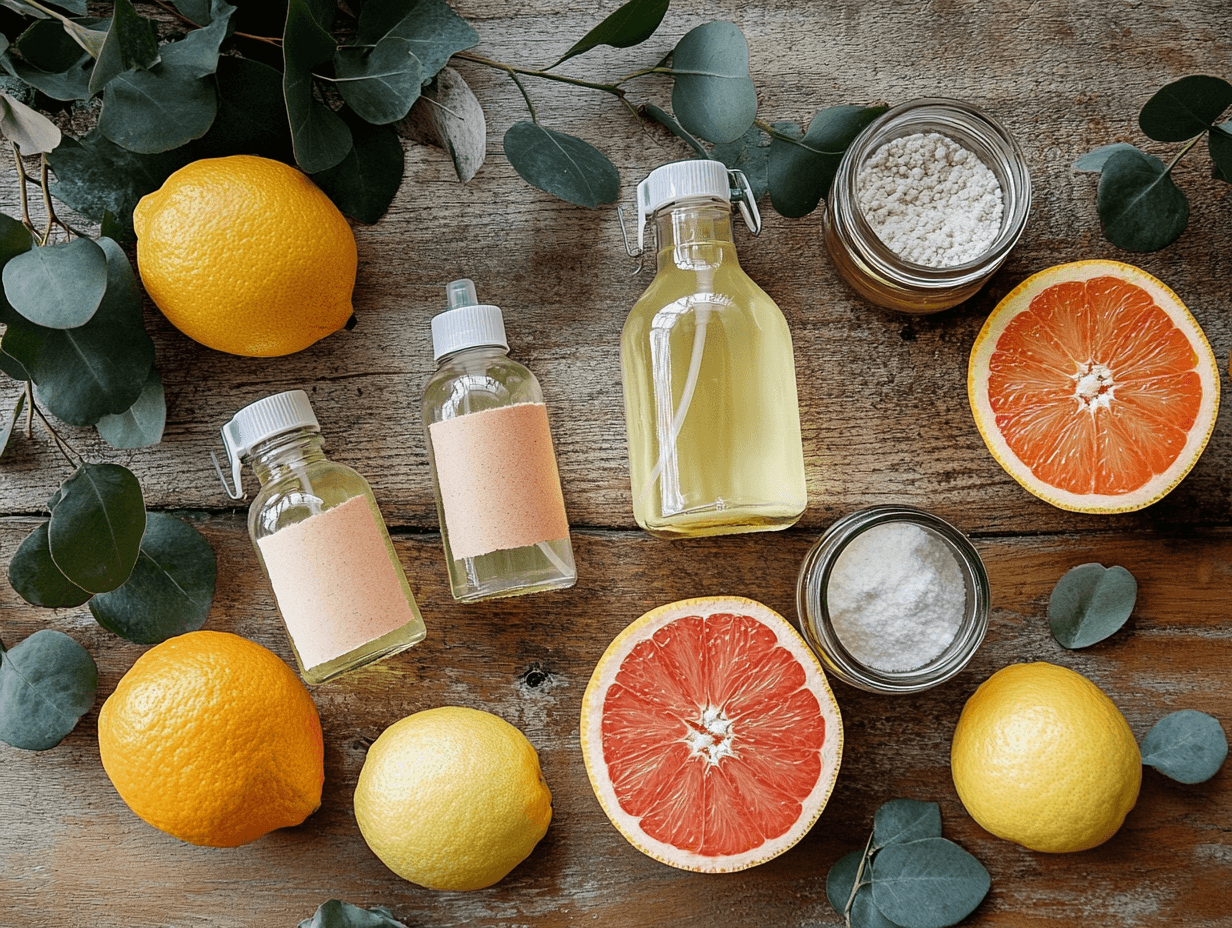
Citrus fruits are more than just a refreshing snack — they’re also powerful allies in your cleaning routine. Their natural oils and acids make citrus an effective natural degreaser, deodoriser, and natural disinfectant. But not all eco friendly cleaning products made from citrus are created equal.
Understanding the difference between citrus essential oils and citrus-infused vinegar can help you choose the best option for your DIY or low-tox home.
Why Citrus Oils Are Effective Cleaners
Citrus oils contain natural compounds like limonene and citral, which give them their distinct scent and cleaning power:
- Limonene: A powerful solvent that cuts through grease and grime, offering antibacterial and antifungal benefits.
- Citric acid: Found in the juice, it dissolves mineral deposits, removes soap scum, and neutralises odours.
- Antibacterial properties: Natural defence against surface bacteria.
- Citrus air freshener effect: Uplifting aroma that replaces synthetic, chemical free cleaning sprays.
Now let’s break down the two most popular citrus-based green cleaning solutions: essential oils and infused vinegar.
Citrus Essential Oils in Cleaning
What they are: These oils — including lemon, orange, lime, and grapefruit oil for cleaning — are extracted from citrus peels using cold-pressing or steam distillation. This produces a concentrated oil packed with natural cleaning power, minus the acidity of the juice.
Best uses:
- Grease cutter: Add a few drops to dish soap or castile soap to tackle stovetops and splashbacks.
- Stain remover: Breaks down sticky residues and adhesive marks.
- Wood polish: Mix with olive oil to revive timber surfaces.
- Natural deodoriser: Combine with water in a spray bottle for a citrus cleaning spray.
- Mould fighter: When combined with vinegar or hydrogen peroxide, helps reduce mould and mildew.
Storage & shelf life:
- Store in dark glass bottles, away from sunlight and heat.
- Shelf life is around 1–2 years before oxidation reduces potency.
Pros:
- Potent — a little goes a long way
- Non-acidic, making them suitable for more surfaces
- Strong antimicrobial and deodorising effects
Cons:
- Can be more expensive than homemade cleaning products
- Must be diluted to avoid damaging plastics or finishes
Citrus-Infused Vinegar for Cleaning
What it is: This DIY citrus cleaner is made by steeping citrus peels in white vinegar for a few weeks. The vinegar draws out the oils and compounds, producing an acidic, citrus-scented cleaner.
Best Uses:
- All-purpose cleaner: Diluted with water, perfect for kitchen benches, glass, and appliances
- Limescale remover: Excellent for kettles, taps, and shower heads
- Toilet bowl cleaner: Tackles stains and odours
- Fabric softener alternative: A splash in the rinse cycle softens clothes and removes detergent build-up
Storage & Shelf Life:
- Keep in a glass jar with a lid in a cool, dark spot
- Lasts 6 to 12 months, depending on storage
Pros:
- Affordable and easy to make
- Fully biodegradable and non-toxic
- Safe for most surfaces (avoid marble, granite, and delicate metals)
Cons:
- Has a strong vinegar smell (which fades as it dries)
- The acidity may damage sensitive surfaces
Key Differences: Citrus Oils vs Citrus-Infused Vinegar
| Feature | Citrus Essential Oils | Citrus-Infused Vinegar |
| Extraction method | Cold-pressed from peels | Steeped in vinegar |
| Acidity | Non-acidic | Highly acidic |
| Best for | Degreasing, polishing, deodorising | Descaling, general cleaning, sanitising |
| Shelf life | 1–2 years | 6–12 months |
| Cost | More expensive | Very affordable |
| DIY-friendly | Needs to be purchased | Easy to make at home |
Which One Should You Use?
- For grease and stains: Use lemon essential oil cleaning or orange essential oil
- For limescale and mineral build-up: Go for citrus vinegar cleaner recipes
- For natural air freshening: Both are great, but essential oils have a longer-lasting scent
- For budget cleaning: Citrus infused vinegar wins hands down
Final Thoughts
Whether you prefer store-bought oils or homemade vinegar blends, citrus-based cleaners are an excellent way to avoid toxic, synthetic sprays. These eco friendly cleaning products are not only effective but also safer for your home, family, and the environment.
By choosing green cleaning solutions like citrus oils and vinegar, you reduce your exposure to harsh chemicals while enjoying a fresh, clean home the natural way.



